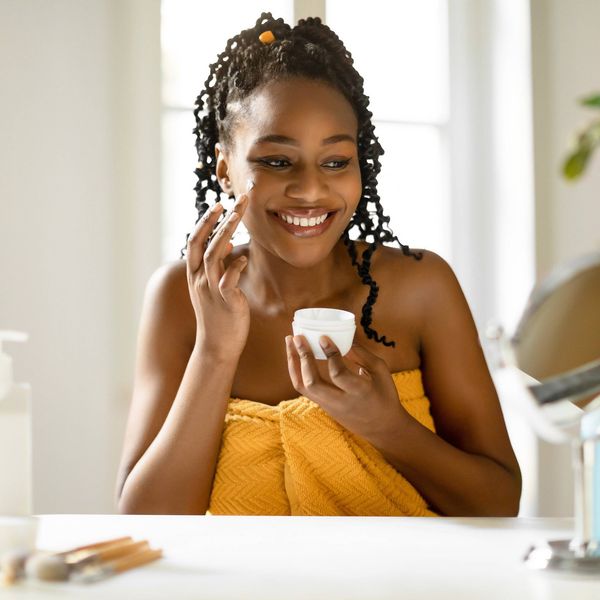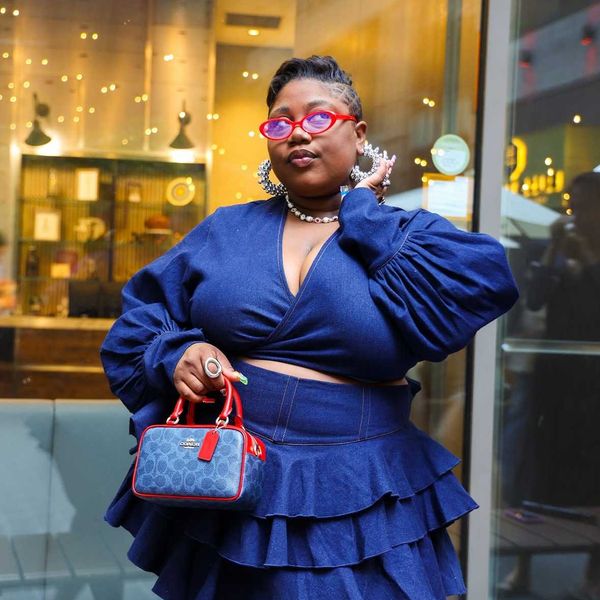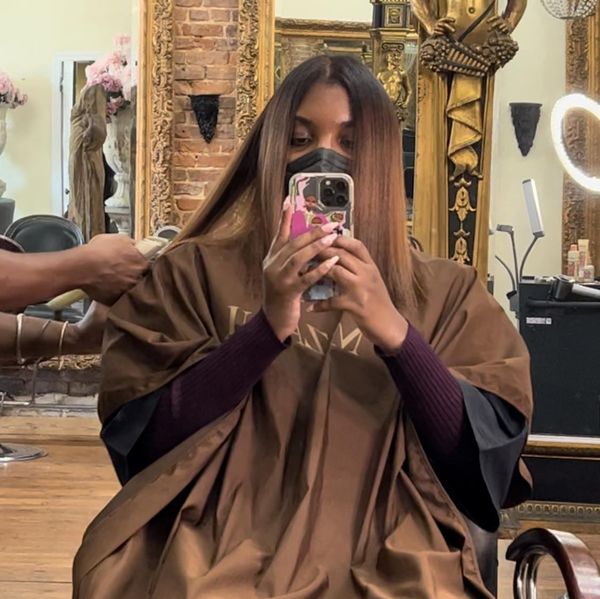What You Need To Know About Shea, Mango, Kokum & Other Body Butters
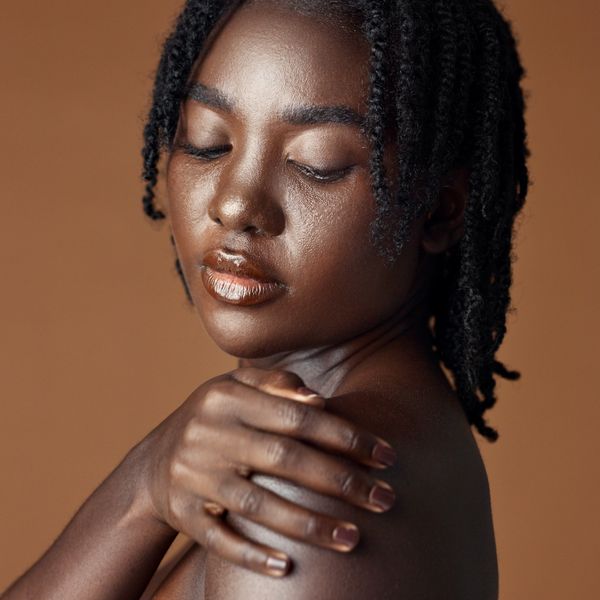
Nashville's weather is so fickle. Take this week, for instance. Monday, it was in the late 80s, and then Tuesday, the high had the nerve to be in the low 60s. That’s why I try my best to take the advice of one of my late great-grandmothers who used to say that you should dress for the season, not the weather (and won’t that preach?). And so, while I ran a couple of errands on Tuesday, I had on a sweatshirt, some jeans, and a pair of flip-flops (hey, they were comfortable).
Now, I must admit that my feet “told on me a bit” because they were dry dry — which is what traditionally happens to them whenever the weather gets cooler. And since I don’t use lotion and “sealing my skin” with my current favorite oil (plum oil) typically isn’t enough, this is the time of year when I adore body butters the most.
Aside from the fact that body butters are great because they’re extracted from natural things like nuts, seeds, and beans, and because there is no water in them, body butters are also thicker than lotions and other popular body creams. Know what else? Body butters are really good for your skin because they come with all sorts of nutrients (including various vitamins, minerals, fatty acids, proteins, and antioxidants) sans any chemicals.
So, since we’re pretty deep into autumn at this point, if you are looking for a way to keep your skin soft, smooth, hella hydrated, and even glowing, here are 10 different types of butters that can give you exactly what you need — head to toe too.
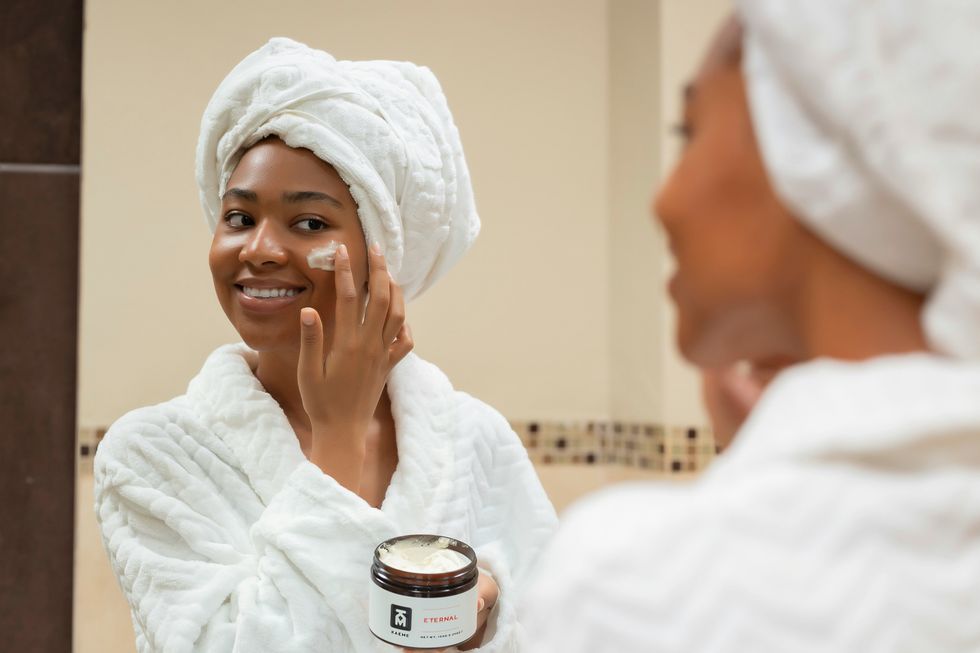
Unsplash
1. Shea Butter
Aside from the classic cocoa butter (which I will get to before this is over, for sure), probably the most popular body butter on this list is shea butter. Shea butter is actually a type of “fat” that comes from the nut that hangs off of shea trees (in West Africa).
Because it’s loaded with antioxidants, it contains antifungal properties along with ones that help to boost collagen production; it works well as a natural sunscreen; it helps to fade skin discoloration, stretch marks, and acne marks; it soothes eczema and psoriasis; it reduces the inflammation that is associated with arthritis; it definitely deeply moisturizes your skin, and it even treats dandruff (and reduces hair breakage) — how could you not have at least one tub of shea butter in your possession?
Anyway, because shea butter is so commercialized at this point, if you want to make sure that you are getting the kind that is as raw and unrefined as possible, there are some purchasing tips that you should check out here.
2. Hemp Seed Butter
So, hemp seeds are seeds that literally come from — yep, you guessed it, the Cannabis sativa, which is a hemp plant. That said, if you’re low-key wondering if they can get you high, they only contain an itty-bitty amount of THC, so…probably not. Anyway, hemp butter is good for your skin because the fatty acids in it are known to soothe eczema, reduce overall itchiness and irritation, and, yes, really quench dry skin. And since the properties in hemp seeds can also help to reduce PMS and menopause-related symptoms, you definitely should cop you some.
This particular body butter you can find on sites like Etsy here. Or, if you’d prefer to make some from scratch, check out this recipe here.
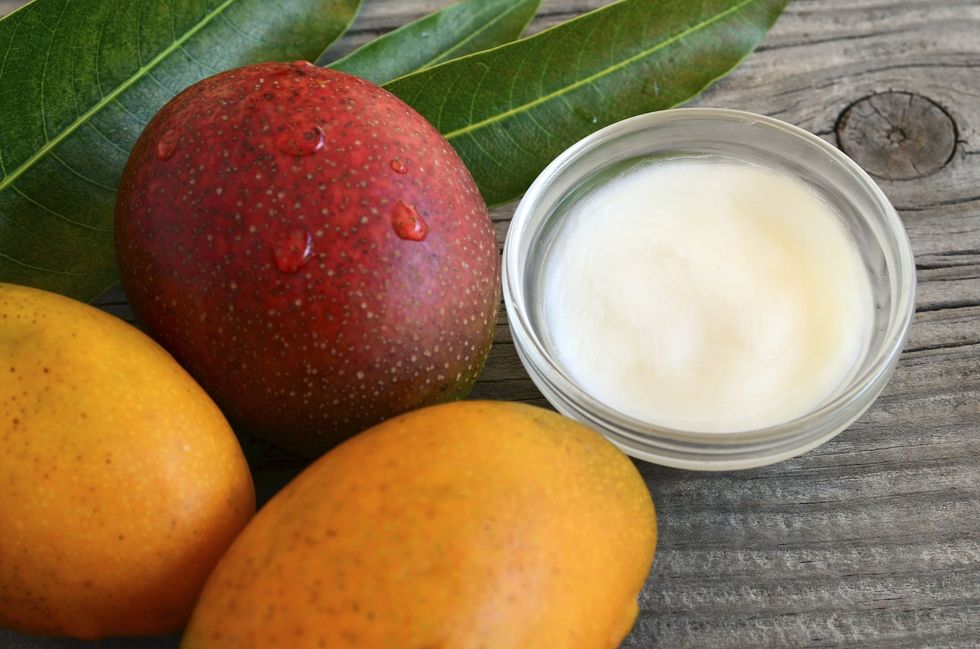
Getty Images
3. Mango Butter
A type of body butter that I can 1000 percent vouch for is mango butter. This kind of butter is made from mango seeds. Between the antibacterial and antimicrobial along with the antioxidants that it contains, mango butter will help to heal damaged skin cells, and moisturize your skin, and the salicylic acid in it will help to protect your skin from UV rays (which are around whenever the sun is out, regardless of what time of year it is).
Since mango butter is the type of body butter that won’t clog your pores or leave a greasy residue, you can use it even if you’ve got acne-prone skin. As a bonus, if you’re looking for a butter that will also hydrate your hair, mango butter can do that, too, while also serving as an all-natural heat protectant before using a blow dryer or flat iron. Awesome, indeed. Some places to purchase raw mango butter include here, here, and here.
4. Tucuma Butter
Tucuma seeds come from the tucuma palm tree that is in South America. It’s a type of fruit that has a ton of fatty acids in it along with antioxidants. The cool thing about this particular butter is it’s so good in the hydration department that a lot of people use it on their hair in order to smooth their cuticles and reduce frizzing.
And since it’s great for your hair, at the very least, consider applying it to your scalp once a week or even using it on the driest parts of your body (like the heels of your feet, your hands, elbows, and legs) after getting out of the bath or shower in order to properly “seal” your skin. You can get some raw tucuma butter here and here.
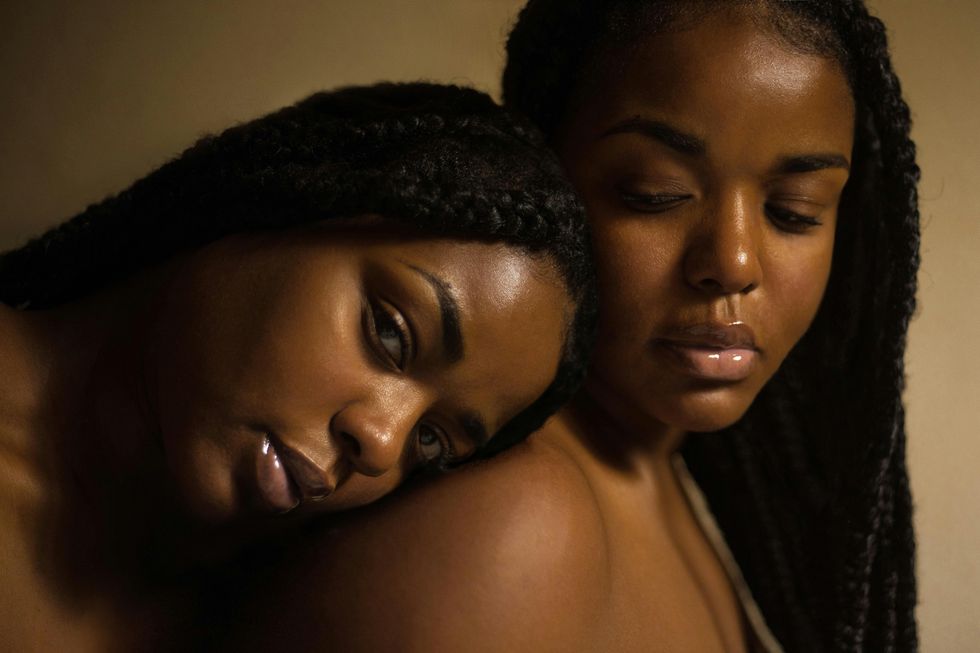
Unsplash
5. Almond Butter
I already know. Some of y’all just read this one and thought it was a typo because, usually when the topic of almond butter comes up, it’s in edible form. Okay, but here’s the thing — did you know that almonds are really good for your skin? One reason is because of all of the magnesium and vitamin E that’s in it.
Another is because it contains properties that can protect your skin from UV damage, environmental pollution, and other things that can cause damage to your skin cells. Another cool thing about almonds is all of the vitamin E in them can help to prevent and/or reduce hyperpigmentation as the linoleic acid in it can help to hydrate, especially the skin of women who are going through perimenopause or are in postmenopausal. Another perk of almonds is they can help to prevent and/or reduce the appearance of stretch marks.
That said, a great (and easy) recipe for this type of body butter is to go here to make raw almond butter; then add rosewater and some manuka honey (add as much as you want to get the consistency that you’d prefer). Rosewater contains antioxidants, reduces skin irritation, and hydrates. And, as far as manuka honey goes, well, check out “Manuka Honey Is The Ultimate Beauty Find” when you get a chance. It’s just what the title says that it is.
6. Babassu Butter
The babassu palm tree also hails from South America and actually, when it comes to the skin, it’s mostly used in oil form. What it’s best known for is speeding up the healing process of minor cuts and skin wounds as well as reducing the vaginal discharge that is associated with hormonal imbalances. Anyway, the potent amount of anti-inflammatory and antioxidant properties, as well as all of the fatty acids in babassu oil help to moisturize your skin without leaving any greasy residue.
Something else that’s pretty dope about it is that studies say that babassu oil can leave your skin feeling soft and smooth without leading to any breakouts. There is a word of caution with this one, though. Some health professionals say that there hasn’t been enough research conducted to say that it’s completely safe for pregnant or breastfeeding women to use, so definitely speak with your healthcare provider if you happen to fit into either category.
For everyone else, you can purchase some babassu butter here, or if you’d prefer to go the DIY route, you can get the oil here, and a quick two-ingredient recipe is here.
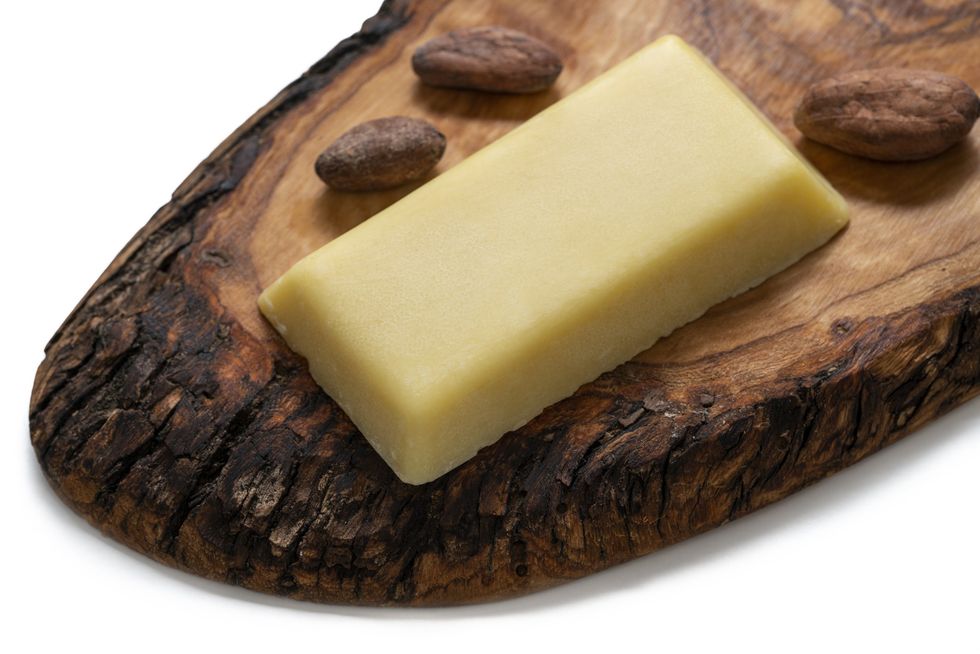
Getty Images
7. Cocoa Butter
As I said earlier, cocoa butter is probably the most popular body butter of them all — and with just cause. The saturated/fatty fats in the butter do everything from repairing the barrier of your skin and deeply moisturizing it to improving the elasticity of your skin and smoothing the appearance of scars and stretch marks.
Another thing to keep in mind about cocoa butter is if you happen to struggle with rashes from eczema or dermatitis, it can speed up the healing process of those as well. The vitamin E that’s in cocoa butter can make it a great all-natural lip balm on those cold and windy days, too. Cocoa butter is pretty easy to find. If you want it in its rawest form, though, some places include here and here.
8. Kokum Butter
Kokum comes from the seeds of the fruit of the kokum tree. Thanks to its anti-inflammatory properties and antioxidants, as well as the vitamins B and E, magnesium, and manganese that it contains, kokum is able to treat issues that are related to inflammation from dermatitis. Not only that, but when it’s turned into butter form, kokum is a popular skincare ingredient thanks to its ability to deeply hydrate the skin without clogging your pores in the process. And, since it has so much Vitamin E in it, you can also use it to reduce the appearance of fine lines and wrinkles, fade scars, and soothe any itching that may come from having really dry skin.
Places like Amazon sell kokum butter in its rawest form. One merchant can be found here.
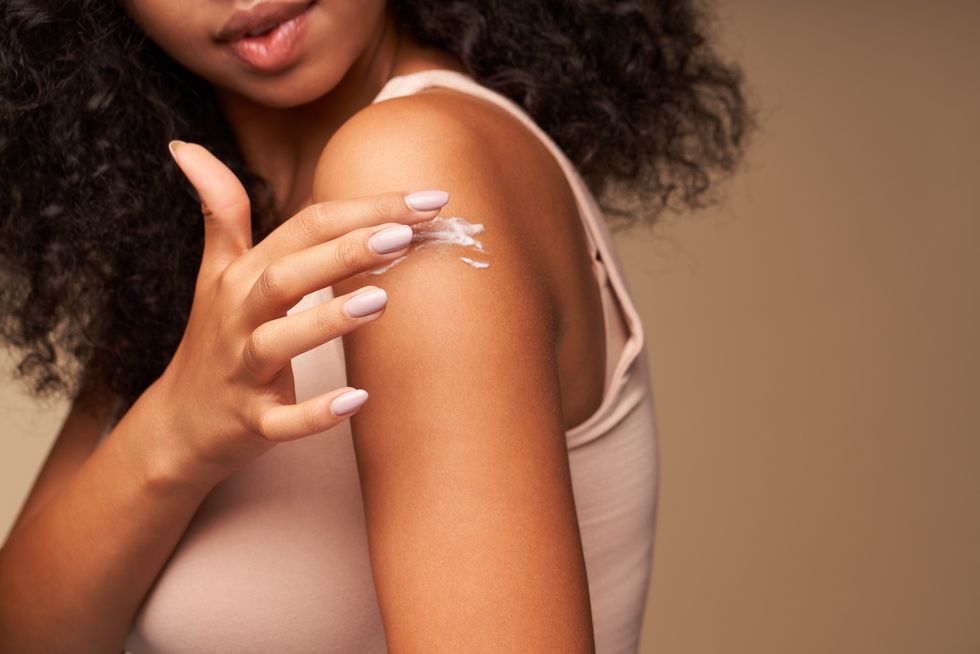
Getty Images
9. Coconut Butter
Something that you’ve heard me mention several times throughout this article is fatty acids. The reality is if you want your skin to get and remain in peak condition, it needs those in order to add elasticity, deeply hydrate, speed up the healing process of surface wounds, help to prevent breakouts and slow down the aging process of your skin from top to bottom. Well, something that contains several different types of fatty acids is a coconut.
Aside from the other benefits that I just mentioned, another thing that is bomb about using coconut in the form of body butter is it also has properties that help to keep skin-related infections like athlete’s foot and cellulitis (a pretty serious skin infection that’s caused by bacteria) from becoming a real issue. Another wonderful thing about this fruit is it is an all-natural soother if eczema is something that you happen to deal with. Coconut butter can be purchased in its raw form at places like Amazon here.
10. Sal Seed (Tree) Butter
Yeah, don’t even get me started on the fact that it was hard to find a lot of scientific articles on this last type of butter. SMDH. That’s because, while the West likes to pump medication down our throats, natural approaches to our health are something that isn’t explored and/or shared en masse nearly enough (because it doesn’t make the same kind of money, and yet, I digress). And you know what? All that does is make me want to share uncommon natural things, even more, chile — like Sal seed butter.
A tree in India produces the seed, and it’s great for your skin because it is also rich in fatty acids — the kind that soothes super dry skin, helps to slow down the appearance of aging in your skin, and even brings relief to achy muscles. Matter of fact, after doing some extra digging, I discovered that many cosmetic companies like to use Sal seed as one of their ingredients (well, looka there). If you’d like to give this particular body butter a shot, especially as something to massage yourself with, you can purchase some here, here, or here.
____
Okay, so if you clicked on some of the links of the various body butters and thought to yourself, “They don’t have the consistency that I’m looking for,” that’s probably because you’ve got whipped body butter in mind. No problem. After buying the raw butter, all you need is an electric mixer, some of your favorite carrier oils (to make the butter super smooth), essential oils (for fragrance), and a container (with a lid), and you’re good to go.
You can go here for a DIY whipped body butter recipe that you can read or you can check out a YouTube video on how to make your own whipped body butter here. When stored in a cool, dark, dry place, homemade body butter can last anywhere from 3-6 months — if you make some now, that can take you well into late winter/early spring.
So…what are you waiting for? Between the cold weather that’s steadily coming outside and the HVAC unit’s dry heat indoors, your skin needs the TLC of some body butter — and now, you know just the kind to indulge it with. Enjoy!
Let’s make things inbox official! Sign up for the xoNecole newsletter for love, wellness, career, and exclusive content delivered straight to your inbox.
Featured image by Jacob Wackerhausen/Getty Images
- Chilli And Mýa Share Their Secrets For Remaining Flawless And Fabulous ›
- These Foods Will Give Your Skin & Hair The Moisture They Crave ›
- Question: Do You Have A 'Butt Care Regimen'? ›
- From Educator To Entrepreneur: Abena Boamah-Acheampong On Creating A Sustainable Brand With Hanahana Beauty ›
This Is How To Keep 'Holiday Season Stress' From Infecting Your Relationship
Hmph. Maybe it’s just me, but it seems like there is something really weird happening in the fall season air (because winter doesn’t officially begin until December 21) that cuddle season is in full swing while break-up season is as well. In fact, did you know that break-ups are so popular during the holiday season that December 11 is deemed Break-Up Day?
The reasons why relationships shift around this time vary; however, I did both roll my eyes and chuckle when I read that a very popular one is because it’s an easy way to get out of getting one’s significant other a Christmas present. SMDH.
Anyway, I personally think that the less shallow folks out here may contemplate calling things “quits” or they at least distance themselves a bit from their partner (and what I’m referring to is serious relationships) due to all of the stress and strain that oftentimes comes with the holidays whether it be financial, familial, due to their tight schedules or something else.
Listen, I would hate for you and your man to miss the fun and happiness of experiencing this time of year, all because you are so overwhelmed or irritated that you can’t really enjoy it. That’s why I have a few practical tips for how to avoid allowing the typical holiday season stress from INFECTING your relationship.
Manage Your Expectations
 Giphy
GiphyUnmanaged expectations. If there is a main reason why the holiday season tends to be so stress-filled for so many people, I’d bet good money that this is the cause. And when you’re in a long-term relationship, expectations can manifest themselves in all sorts of cryptic and/or unexpected ways. You might have relatives who assume that you are going to be with them for Thanksgiving or Christmas when you have other plans in mind. You might be thinking that you are going to spend one amount for presents while your man is thinking something totally different. When it comes to scheduling, your signals may be crossed.
And you know what? To all of these scenarios, this is where clear and consistent communication come in. Don’t assume anything. Don’t dictate anything either. From now until New Year’s, mutually decide to check in once a week, just to make sure that you are both on the same page as it relates to the holidays and what you both are thinking will come along with it. The less blindsided you both feel, the less stressed out you will be. Trust me on this.
Set (and Keep) a Budget
 Giphy
GiphyOkay, so I read that last year, 36 percent of Americans incurred some type of holiday-related debt. Hmph. Last year, there was still some sense of normalcy in this country, chile, so I can only imagine what finances are gonna look like over the next several weeks. That said, since I don’t know a lot of people who don’t find being broke stressful, make sure that you and your bae set a budget and then stick to it this year — no ifs, ands or buts.
Because really, y’all — it doesn’t make sense to deplete savings and/or max out credit cards for a few days of giggles only to be damn near losing your mind because you don’t know how to make ends meet come Dr. Martin Luther King, Jr. Day.
And by the way, this tip doesn’t just speak to things like food and gifts; I also mean travel. If it doesn’t make a ton of sense (or cents) to be all over the place this year — DON’T BE.
Keep Matthew 5:37 at the Forefront
 Giphy
GiphyIf off the top of your head, you don’t know what Matthew 5:37 says, no worries, here ya go: “But let your ‘Yes’ be ‘Yes,’ and your ‘No,’ ‘No.’ For whatever is more than these is from the evil one.” That verse right there? Oh, it’s a boundaries lifesaver! I say that because do you see “maybe” or “I’ll think about it” in there? Nope. LOL. It says that you should tell people “yes” or “no” and leave it at that — and that complements Anne Lamott’s quote, “’No’ is a complete sentence” impeccably well. Yeah, you’ve got to remember that anything beyond a yes or no to a request is privileged information; you don’t owe anyone details or an explanation.
Besides, if you are really honest with yourself, when someone asks you something and you give a “Umm, let me think about it” kind of reply, more times than not, you already know what your answer is going to be — so why not let you both off of the hook? Give your response. Commit to that. And let everyone (including yourself) get on with their lives and schedules.
I promise you that when it comes to those holiday parties, you are pissing more folks off by not RSVP’ing or doing so and not showing up than just saying, “Thank you but not this year” off the rip.
Remember That Your Personal Space Is Privilege Not a Right
 Giphy
GiphyA friend of mine recently bought a new house and invited me over to come see it. He’s a single man with no children, so as I was taking in all of the space that he had, especially as I walked through his finished basement, I joked about relatives coming to live with him. “Hell no” and “absolutely not” were pretty much his immediate responses as he went on to say that some folks even had the nerve to be offended when he told them that he had no intentions on taking DNA in.
Ain’t it wild how people think that your stuff is their right? And yes, that brings me to my next point. Your home is your sanctuary space. If you want to host folks this year — cool. If not, ALSO COOL. Please don’t let folks (family included) guilt you into how they want you to act or even into what they would do if the shoe was on the other foot. You are not them — and as one of my favorite quotes states, “If two people were exactly alike, one of them would be unnecessary.” (A man by the name Larry Dixon said that.)
Hell, my friends? They know that I am good for sending them random things that they need or even want all throughout the year. Coming over to hang out at my pace, though. Uh-uh. Chalk it up to being a card-carrying member of the ambivert club yet I like keeping my living space personal — and I sleep like a baby, each and every night, for feeling that way.
Always remember that your space, your time, your resources, your energy and shoot, yourself period (including your relationship), are all things that are your own. You get to choose how, when and why you want to share them. The holiday season is certainly no exception.
Cultivate Some “You Two Only” Traditions
 Giphy
GiphyIt’s not uncommon for some couples to hit me up after the holiday season to “detox.” Sometimes it’s due to the financial drama (and sometimes trauma) that they experienced. Sometimes it’s because they allowed their relatives (especially in-laws) to get more into their personal business than they should’ve. More than anything, though, it tends to be because they didn’t get enough quality time together and so ended up feeling “disconnected.”
Please don’t let that happen. Listen, I’m not even a holidays kind of woman and yet, I will absolutely sit myself down with some hot chocolate and chocolate chip cookies to enjoy a Hallmark holiday film or two. Aside from the fact that most of them are lighthearted and sweet, I also like that they usually focus on couples loving on each other amidst all of the holiday beauty and ambiance — which is something that all couples should set aside some time to do.
Maybe it’s a vacation. Maybe it’s a staycation. Or maybe it’s my personal favorite, A SEXCATION. Whether it’s for a few days, the weekend or even overnight — don’t you let the holidays go by without setting aside time for you and your man to celebrate one another. Don’t you dare (check out “Are You Ready To Have Some Very Merry 'Christmas Sex'?”).
GET. SOME. REST.
 Giphy
GiphyI once read that 8 out of 10 people get stressed out over the holidays and 3 out of 10 lose sleep during to it — and when you’re stress-filled and sleep-deprived, that can absolutely lead to hypersensitivity, making mountains out of molehills and even not being in the mood for sex.
Your relationship can’t afford to go through any of this, so definitely make sure to prioritize rest. I don’t care how unrealistic it might seem during this time, sleep should never be seen as a luxury; it will always and forever be a great necessity.
That said, try to get no less than six hours of shut-eye in (check out “6 Fascinating Ways Sex And Sleep Definitely Go Hand In Hand”) and even ask your bae to take a nap with you sometimes (check out “Wanna Have Some Next-Level Sex? Take A Nap, Sis.”). Not only will sleep help to restore your mind, body and spirit but, when it’s with your partner, it’s an act of intimacy that can make you both feel super connected, even in the midst of what might feel like chaos.
___
Holiday season stress is real. Still, never give it the permission or power to throw your relationship off. Put you and your man first and let the holidays be what they are gonna be, chile.
Let’s make things inbox official! Sign up for the xoNecole newsletter for love, wellness, career, and exclusive content delivered straight to your inbox.
Featured image by Shutterstock
How To Avoid Being An Emotionally Impulsive Spender This Holiday Season
Geeze. Can you believe that we are just a few days out from another Christmas? Yeah, me neither. In fact, because I’m not a holidays person myself (check out “So, What If You Don't Observe Holidays?”), it wasn’t until one of my clients was venting about how stressed out she was due to all of the holiday season procrastinating that she had been doing that I realized just how fast December is actually flying by.
If, like her, you’re feeling frazzled because, although you told yourself last year that you weren’t going to wait until the last minute to “handle your business,” you ended up doing exactly that, fret not. I’ve got 10 tips that can keep you from making emotionally-triggered decisions as far as your financial expenses are concerned. Merry Christmas. #wink
1. Create a Budget. Stick to It.
 Giphy
GiphyBudgets, boy. I recently read that one of the reasons why they don’t work for a lot of people is because many folks don’t have a clue about how much money they spend on a monthly basis to begin with. SMDH. That said, at the end of the day, it’s important to remember that a budget is simply setting boundaries/limits on your spending — and being intentional about moving in this fashion is always a wise move; especially when it comes to this time of the year…especially being that it’s typical for half of all Americans to take on some type of holiday season debt with 17 percent needing six (or more) months to pay it off.
Know what can prevent this kind of financial chaos? A SPENDING BUDGET. Tips for how to create one of your own this year can be found here.
2. Never Shop When You’re Stressed or Pressed
 Giphy
GiphyYou know how they say that it’s not a good idea to go grocery shopping when you’re hungry? Although the holiday season can be a stressful time, avoid shopping for gifts (or décor or food for recipes) when you are feeling stressed out or pressed for time. More times than not, that cultivates anxiety which could cause you to either purchase things that you don’t really want or to spend money that you don’t really have (P.S. If you’re relying on credit cards, that qualifies as money that you don’t really have. Just sayin’).
3. Don’t Keep Up with the Joneses
 Giphy
GiphyKnow something else that can stress you out: trying to keep up with the Joneses. And y’all, now that we have social media, the reality is that envy is at an all-time high. That’s because it can be really easy to watch holiday engagements, holiday trips and folks bragging about the things that they’ve received in times past, only for you to find yourself wishing that you were them — or putting pressure on yourself and those in your world to keep up.
Listen, it is King Solomon who once said, “So are the ways of everyone who is greedy for gain; It takes away the life of its owners” (Proverbs 1:19 — NKJV) and “A sound heart is life to the body, but envy is rottenness to the bones” (Proverbs 14:30 — NKJV) and he’s considered to be the wisest man who ever lived (during his time — I Kings 4:30). Yeah, both of these verses are a spiritual reminder that whatever you are planning to do or give, do it out of the goodness of your heart — not so that you can low-key “outdo” the next guy.
4. No Need to “Tit-for-Tat”
 Giphy
GiphyThis one might be a bit controversial yet I’m totally okay with that. I don’t care what the occasion is, no one is OWED a present. A gift is a voluntary token of one’s appreciation or affection. That said, if you decide to give someone a present this year, don’t automatically expect something in return. If you get something, cool. If not, if you were giving for the right reasons, it really shouldn’t matter (RIGHT?). On the flip side, if someone decides to get you something and you don’t have something to offer in return, also cool.
Other than going to someone’s home for a holiday dinner or party, for anyone to feel like they should have something in hand because someone else does…that’s not giving, that’s competing — and that absolutely should not be the spirit that you are in (or around) during this time of year.
Again, a gift is not an obligatory thing. If you’ve always thought otherwise, it’s time to do some serious reprogramming.
5. Avoid the Pressure to Buy for Lots of Adults
 Giphy
GiphyLast month, Newsweek published an article that said it’s wise to not spend a ton of money purchasing gifts for adults. A financial expert in the piece said that it’s best to buy for kids because, more times than not, you’re going to get adults something that they already have a lot of, they don’t really need or they’re not going to use (beyond maybe regifting) anyway.
If you’re not feeling that insight, my take would be to exchange names and set a price cap for the grown folks. I say that because, I don’t think that people ever outgrow wanting something over Christmas. It’s just that the over-the-top energy should be reserved for the kiddies — and even then, the “4-gift rule” (want, need, read, experience) is probably your best bet for them…financially and otherwise.
6. Go for Thoughtful over Expensive
 Giphy
GiphyIt’s kind of wild how much close-to-torture folks send themselves through to purchase gifts that, a good 6-8 months now, most folks aren’t even going to remember. That’s why it’s also a good idea to purpose in your mind to get something thoughtful over expensive.
Honestly, that’s a big part of the reason why Etsy continues to be a go-to for gifts (for every occasion) for me. It’s because you can oftentimes get things customized/personalized which ends up meaning so much more to people than something that you bought at a generic department store that might have a high price tag yet still lacks in sentimentality and deep meaning.
7. Use Coupons and Promo Codes
 Giphy
GiphyCoupons (and promo codes) are a slippery slope in the sense that…they remind me of when I used to go overboard while thrift store shopping. I say that because, just because I might find several bomb dresses for under $20, what am I going to do with 50 of ‘em (over time)? It’s just as much of a waste of money as buying couture if neither option gets much use.
And that’s kind of the thing about coupons and promo codes. Some people end up overspending because they rationalize that so long as there are discounts attached, it’s all good. At the same time, this doesn’t mean that you should forego coupons and promo codes altogether. The key is to put together your shopping list (and budget) and then use discounts specifically for those items. If you do this, you could save well over $1,000 annually (at least, depending on what you decide to buy).
8. Avoid Add-Ons
 Giphy
GiphyYeah. Dodge add-on expenses. Add-ons like what? The first thing that comes to my mind is a warranty. What’s the chance that someone is actually going to need that? Another example is paying for things to be “professionally” gift wrapped. Chile, throw that stuff in a gift bag with some tissue paper and go on about your day. All good.
9. Rethink Gift Cards
 Giphy
GiphyIf there is any time of the year when there is a noticeable hike in gift card purchases, now would be it. And although they are a convenient approach to gift giving, at the same time, many come with hidden fees, the full amount oftentimes goes unused (which ends up being a waste of money) and they do come with expiration dates that are oftentimes forgotten.
So, if you’re someone who likes to wait until the last minute to do your holiday shopping, resist the urge to impulsively pick up a handful of gift cards. Unless it’s to a place that you know someone is going to use within the next few months, they could end up in somebody’s kitchen drawer for the next couple of years. And what a waste that would be.
10. They’ll Get It When They Do. And That’s Okay.

=
GiphyOne more. Although it is super thoughtful and proactive to get people their gifts in time for whatever occasion you purchased them for, if trying to reach that goal is going to require paying for rush shipping that is damn near as high as the price of gift or spending a lot of gas money that you don’t have at the moment to drive miles and miles away — take the pressure off to spend a ton of cash just to make sure that something arrives at December 25. Listen, through doing business with Etsy, I have learned that through this administration, there are all sorts of tariff issues going on and the USPS is slower than ever too, so paying more may not guarantee much.
The hack? Send a message that something special is coming…soon enough. The thought really is what counts (more times than not); plus, it builds anticipation of something good coming, even if it’s after all of the Christmas Day hoopla. And no one (with sense) is going to have a problem with that.
Now don’t you feel better? Happy Holiday Shopping, sis.
Let’s make things inbox official! Sign up for the xoNecole newsletter for love, wellness, career, and exclusive content delivered straight to your inbox.
Featured image by Shutterstock



